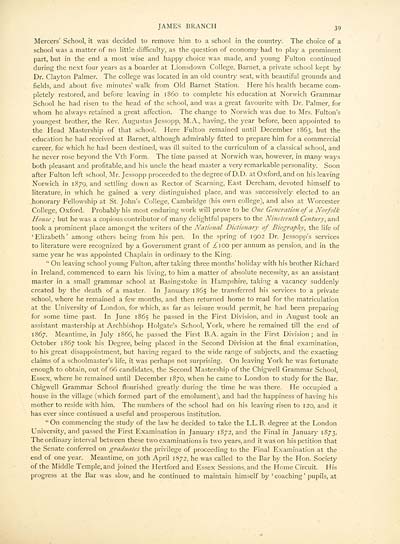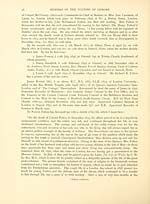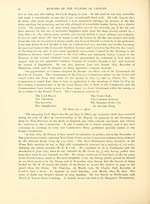Memoirs of the Fultons of Lisburn
(45) Page 39
Download files
Complete book:
Individual page:
Thumbnail gallery: Grid view | List view

JAMES BRANCH 39
Mercers' School, it was decided to remove him to a school in the country. The choice of a
school was a matter of no little difficulty, as the question of economy had to play a prominent
part, but in the end a most wise and happy choice was made, and young Fulton continued
during the next four years as a boarder at Lionsdown College, Barnet, a private school kept by
Dr. Clayton Palmer. The college was located in an old country seat, with beautiful grounds and
fields, and about five minutes' walk from Old Barnet Station. Here his health became com-
pletely restored, and before leaving in i860 to complete his education at Norwich Grammar
School he had risen to the head of the school, and was a great favourite with Dr. Palmer, for
whom he always retained a great affection. The change to Norwich was due to Mrs. Fulton's
youngest brother, the Rev. Augustus Jessopp, M.A., having, the year before, been appointed to
the Head Mastership of that school. Here Fulton remained until December 1863, but the
education he had received at Barnet, although admirably fitted to prepare him for a commercial
career, for which he had been destined, was ill suited to the curriculum of a classical school, and
he never rose beyond the Vth Form. The time passed at Norwich was, however, in many ways
both pleasant and profitable, and his uncle the head master a very remarkable personality. Soon
after Fulton left school, Mr. Jessopp proceeded to the degree of D.D. at Oxford, and on his leaving
Norwich in 1879, and settling down as Rector of Seaming, East Dereham, devoted himself to
literature, in which he gained a very distinguished place, and was successively elected to an
honorary Fellowship at St. John's College, Cambridge (his own college), and also at Worcester
College, Oxford. Probably his most enduring work will prove to be One Generation of a Norfolk-
House ; but he was a copious contributor of man)' delightful papers to the Nineteenth Century, and
took a prominent place amongst the writers of the National Dictionary of Biography, the life of
'Elizabeth' among others being from his pen. In the spring of 1902 Dr. Jessopp's services
to literature were recognized by a Government grant of ,£100 per annum as pension, and in the
same year he was appointed Chaplain in ordinary to the King.
" On leaving school young Fulton, after taking three months' holiday with his brother Richard
in Ireland, commenced to earn his living, to him a matter of absolute necessity, as an assistant
master in a small grammar school at Basingstoke in Hampshire, taking a vacancy suddenly
created by the death of a master. In January 1865 he transferred his services to a private
school, where he remained a few months, and then returned home to read for the matriculation
at the University of London, for which, as far as leisure would permit, he had been preparing
for some time past. In June 1865 he passed in the First Division, and in August took an
assistant mastership at Archbishop Holgate's School, York, where he remained till the end of
1867. Meantime, in July 1866, he passed the First B.A. again in the First Division; and in
October 1867 took his Degree, being placed in the Second Division at the final examination,
to his great disappointment, but having regard to the wide range of subjects, and the exacting
claims of a schoolmaster's life, it was perhaps not surprising. On leaving York he was fortunate
enough to obtain, out of 66 candidates, the Second Mastership of the Chigwell Grammar School,
Essex, where he remained until December 1870, when he came to London to study for the Bar.
Chigwell Grammar School flourished greatly during the time he was there. He occupied a
house in the village (which formed part of the emolument), and had the happiness of having his
mother to reside with him. The numbers of the school had on his leaving risen to 120, and it
has ever since continued a useful and prosperous institution.
" On commencing the study of the law he decided to take the LL.B. degree at the London
University, and passed the First Examination in January 1872, and the Final in January 1873.
The ordinary interval between these two examinations is two years, and it was on his petition that
the Senate conferred on graduates the privilege of proceeding to the Final Examination at the
end of one year. Meantime, on 30th April 1872, he was called to the Bar by the Hon. Society
of the Middle Temple, and joined the Hertford and Essex Sessions, and the Home Circuit. His
progress at the Bar was slow, and he continued to maintain himself by ' coaching ' pupils, at
Mercers' School, it was decided to remove him to a school in the country. The choice of a
school was a matter of no little difficulty, as the question of economy had to play a prominent
part, but in the end a most wise and happy choice was made, and young Fulton continued
during the next four years as a boarder at Lionsdown College, Barnet, a private school kept by
Dr. Clayton Palmer. The college was located in an old country seat, with beautiful grounds and
fields, and about five minutes' walk from Old Barnet Station. Here his health became com-
pletely restored, and before leaving in i860 to complete his education at Norwich Grammar
School he had risen to the head of the school, and was a great favourite with Dr. Palmer, for
whom he always retained a great affection. The change to Norwich was due to Mrs. Fulton's
youngest brother, the Rev. Augustus Jessopp, M.A., having, the year before, been appointed to
the Head Mastership of that school. Here Fulton remained until December 1863, but the
education he had received at Barnet, although admirably fitted to prepare him for a commercial
career, for which he had been destined, was ill suited to the curriculum of a classical school, and
he never rose beyond the Vth Form. The time passed at Norwich was, however, in many ways
both pleasant and profitable, and his uncle the head master a very remarkable personality. Soon
after Fulton left school, Mr. Jessopp proceeded to the degree of D.D. at Oxford, and on his leaving
Norwich in 1879, and settling down as Rector of Seaming, East Dereham, devoted himself to
literature, in which he gained a very distinguished place, and was successively elected to an
honorary Fellowship at St. John's College, Cambridge (his own college), and also at Worcester
College, Oxford. Probably his most enduring work will prove to be One Generation of a Norfolk-
House ; but he was a copious contributor of man)' delightful papers to the Nineteenth Century, and
took a prominent place amongst the writers of the National Dictionary of Biography, the life of
'Elizabeth' among others being from his pen. In the spring of 1902 Dr. Jessopp's services
to literature were recognized by a Government grant of ,£100 per annum as pension, and in the
same year he was appointed Chaplain in ordinary to the King.
" On leaving school young Fulton, after taking three months' holiday with his brother Richard
in Ireland, commenced to earn his living, to him a matter of absolute necessity, as an assistant
master in a small grammar school at Basingstoke in Hampshire, taking a vacancy suddenly
created by the death of a master. In January 1865 he transferred his services to a private
school, where he remained a few months, and then returned home to read for the matriculation
at the University of London, for which, as far as leisure would permit, he had been preparing
for some time past. In June 1865 he passed in the First Division, and in August took an
assistant mastership at Archbishop Holgate's School, York, where he remained till the end of
1867. Meantime, in July 1866, he passed the First B.A. again in the First Division; and in
October 1867 took his Degree, being placed in the Second Division at the final examination,
to his great disappointment, but having regard to the wide range of subjects, and the exacting
claims of a schoolmaster's life, it was perhaps not surprising. On leaving York he was fortunate
enough to obtain, out of 66 candidates, the Second Mastership of the Chigwell Grammar School,
Essex, where he remained until December 1870, when he came to London to study for the Bar.
Chigwell Grammar School flourished greatly during the time he was there. He occupied a
house in the village (which formed part of the emolument), and had the happiness of having his
mother to reside with him. The numbers of the school had on his leaving risen to 120, and it
has ever since continued a useful and prosperous institution.
" On commencing the study of the law he decided to take the LL.B. degree at the London
University, and passed the First Examination in January 1872, and the Final in January 1873.
The ordinary interval between these two examinations is two years, and it was on his petition that
the Senate conferred on graduates the privilege of proceeding to the Final Examination at the
end of one year. Meantime, on 30th April 1872, he was called to the Bar by the Hon. Society
of the Middle Temple, and joined the Hertford and Essex Sessions, and the Home Circuit. His
progress at the Bar was slow, and he continued to maintain himself by ' coaching ' pupils, at
Set display mode to:
![]() Universal Viewer |
Universal Viewer | ![]() Mirador |
Large image | Transcription
Mirador |
Large image | Transcription
Images and transcriptions on this page, including medium image downloads, may be used under the Creative Commons Attribution 4.0 International Licence unless otherwise stated. ![]()
| Histories of Scottish families > Memoirs of the Fultons of Lisburn > (45) Page 39 |
|---|
| Permanent URL | https://digital.nls.uk/95603677 |
|---|
| Description | A selection of almost 400 printed items relating to the history of Scottish families, mostly dating from the 19th and early 20th centuries. Includes memoirs, genealogies and clan histories, with a few produced by emigrant families. The earliest family history goes back to AD 916. |
|---|

